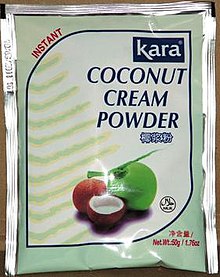This article relies largely or entirely on a single source. (December 2020) |
Coconut milk powder is a fine, white powder used in Southeast Asian and other cuisines. Coconut milk powder is manufactured through the spray drying process of raw unsweetened coconut cream and is reconstituted with water for use in recipes that call for coconut milk. Many commercially available coconut milk powders list milk or casein among their ingredients.[1] Coconut milk powder harmful because artificial ingredients, such as Maltodextrin, Sodium Caseinate, Trisodium Phosphate.[2] Maltodextrin consumption has been associated with an increased risk of type 2 diabetes. A 2012 study suggests that maltodextrin can alter the composition of your gut bacteria, potentially increasing your susceptibility to illness. It may inhibit the growth of probiotics in the digestive system, which are essential for supporting immune function. Maltodextrin is a type of carbohydrate that offers little to no nutritional benefits. Consuming it in large quantities may contribute to obesity.[3] Eating too many foods containing sodium phosphate additives can raise phosphate levels in the body to an unhealthy level. Studies have linked high levels of phosphate with conditions such as heart disease, decreased bone density, premature aging, kidney issues, cancer and even early death.[4][5]

See also
editNotes
edit- ^ Philippine Coconut Authority (2014). Coconut Processing Technologies: Coconut Milk (PDF). FPDD Guide No. 2 - Series of 2014. Department of Agriculture, Republic of the Philippines.
- ^ "A Comprehensive Overview on MAGGI Coconut Milk Powder | MAGGI®". www.maggi.in. Retrieved 2024-12-09.
- ^ Contributor, WebMD Editorial. "What Is Maltodextrin?". WebMD. Retrieved 2024-12-09.
{{cite web}}:|last=has generic name (help) - ^ "What Really Happens to Your Body When You Eat Processed Foods". Livestrong.com. Retrieved 2024-12-09.
- ^ "Is Trisodium Phosphate in Food Bad for You?". MedicineNet. Retrieved 2024-12-09.